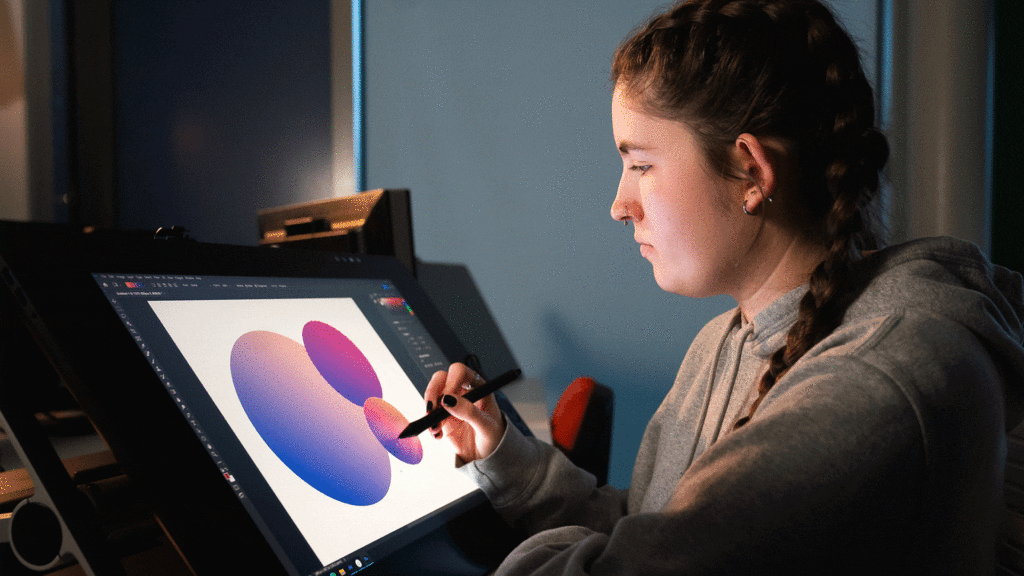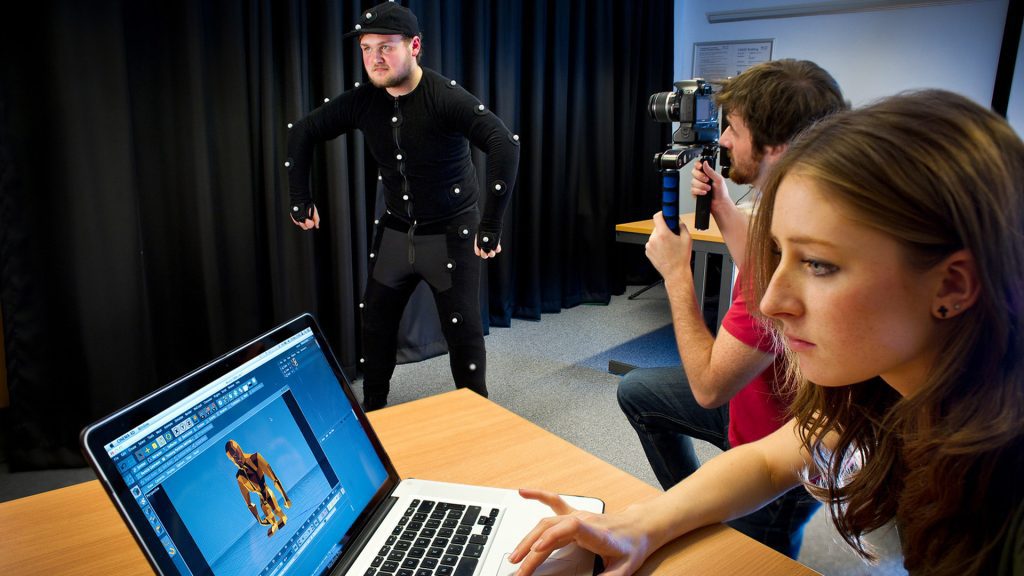Graphic Design BA (Hons)
UCAS code: W212
Help shape the visual world. From the foundations to emergent techniques, with a focus on sustainability, our new graphic design degree develops your skills and ability to create visuals that communicate across multiple platforms. Enter a growing job market where graphic designers are very much in demand.
Overview
| Course length: | 3 years full-time 6 years part-time |
|---|---|
| Start dates: | September 2025 September 2026 |
| Location: | Edge Hill University |
| Example offers: | BBC-BBB (A Level) or DMM (BTEC) View full entry criteria |
| Subject(s): | Animation and Graphic Design |
| Faculty: | Arts and Sciences |
| Department: | English and Creative Arts |

Great graphic design is a genuinely international language. Every time you use an app on your phone, fill up your cart on your favourite website or use an emoji, you’re scrolling through the imaginations of graphic designers. And they’re in demand.
One in 20 workers are employed within the design industry. One in every 10 pounds from all UK exports comes from the design industry (Design Economy report, 2022). ‘Design shapes the world… the scale of what we need to design – and re-design – is enormous,’ states the UK’s Design Council (2022).
Graphic designers create a bridge between products and consumers. Their work is all around us. Websites, posters, infographics, book covers, product labels, logos, business cards, signs, mobile apps, all originate in the creative minds of graphic designers. Our graphic design degree will nurture the next generation, designers working in the heart of communities. You will develop your ability to solve social issues through design, building in sustainability, and ready to take on the challenges identified by the Design Council.
Our course has been developed in collaboration with industry professionals, so you’ll be ready to start your graphic design career on graduation. In your first year you’ll develop foundational skills and knowledge. You’ll learn both traditional and emergent techniques, such as illustration, motion graphics and typography. In Year 2 you’ll work on live design projects with industry, focus on advertising and branding, and explore fields such as design fiction, co-design (often working with communities to address social issues), and user interface design, culminating in a project that could be showcased at an external exhibition. And in your final year you’ll work on professional and live projects, developing your identity as a designer, again showcasing your skills in an exhibition. Live briefs and working with graphic design professionals will enhance your employability, making you ready to enter the job market with serious industry experience, and the know-how to harness your creative drive.
Course features
-
Learn a language option available
-
International students can apply
-
Studying abroad option available
What you'll study
In Year 1 of your graphic design degree you’ll develop the foundational skills and knowledge required to support your developing and emerging design abilities. You’ll explore technical software for graphic design that can then be applied to other fields of design such as photography, gaming and animation. You’ll also learn traditional and emergent craft approaches used in design such as illustration, motion graphics, printmaking, and typography.
In Year 2 you will choose optional modules from subjects such as user interface design, co-design, creative business and design fiction. You will work on a number of live projects and scenarios and will engage with external employers and professionals as part of your study. You’ll be able to develop your own project idea, based on your specialisms, which will be showcased at an external exhibition, event or platform.
In your final year of your graphic design degree you will be consolidating and resolving your skills and abilities to work on professional and live projects, which aim to secure your employment upon graduation. Your creative portfolio will be finalised and your identity as a designer will be clearly defined and showcased in an exhibition; alongside online and in-person self-promotional activities. You will have the opportunity to undertake a placement within a design studio environment, or you may choose to focus your attentions on setting up your own agency.
How you'll study
Teaching and learning for the BA (Hons) Graphic Design course takes place through practical workshops, lectures, seminars, studio-based working and external visits and events. Your learning will be supported by a Personal Tutor, individual and group tutorials and an experienced team of specialist technicians. You will also have the opportunity to attend various exhibitions, events and design studios to further enhance and contextualise your learning experience.
How you'll be assessed
Assessment will be via mainly practical assignments, research projects and individual and group presentations. Written work also accompanies this practical body of work. Assessment approaches include regular in-studio critiques, peer to peer assessment and ongoing formative feedback through prototyping and experimental in-class scenarios and activities. On this programme, the research, ideas and processes of designing are equally as important as the final designed artefacts.
Who will be teaching you
The graphic design degree is taught by an enthusiastic, diverse and professional team with current design industry experience. Lecturers are research-active in design and media, and have up-to-date experience in using the variety of resources available to you. Guest speakers will also contribute to programme delivery through live project briefs and portfolio critiques to develop your industry experience and contacts.
Where your course includes optional modules, these are to provide an element of choice within the course curriculum. The availability of optional modules may vary from year to year and will be subject to minimum student numbers being achieved. This means that the availability of specific optional modules cannot be guaranteed. Optional module selection may also be affected by timetabling requirements. Some restrictions on optional module choice or combinations of optional modules may apply.
Entry criteria
Typical offer 112-120 UCAS Tariff points.
No specific subjects are required although you will be expected to demonstrate your commitment and suitability to pursue a career in graphic design in your application.
You’ll also be invited to present a portfolio of your creative work in support of your application.
Example offers
| Qualification | Requirement |
|---|---|
| A Level | BBC-BBB. |
| BTEC Extended Diploma (or combination of BTEC QCF qualifications) | Distinction, Merit, Merit (DMM). |
| T Level | Overall grade of Merit. |
| International Baccalaureate (IB) | We are happy to accept IB qualifications which achieve the required number of UCAS Tariff points. Subject-specific requirements at Higher Level (HL) Grade 5 may apply. |
| Access to Higher Education Diploma | 45 credits at Level 3, for example 15 credits at Distinction and 30 credits at Merit or 24 credits at Distinction and 21 credits at Merit. The required total can be attained from various credit combinations. |
Please note, the above examples may differ from actual offers made. A combination of A Level and BTEC awards may also be accepted.
If you have a minimum of two A Levels (or equivalent), there is no maximum number of qualifications that we will accept UCAS points from. This includes additional qualifications such as Extended Project Qualification (EPQ), AS Levels that haven't been continued to A Level, and General Studies AS or A Level awards.
English language requirements
International students require IELTS 6.0, with a score no lower than 5.5 in each individual component, or an equivalent English language qualification.
If your current level of English is half a band, one band, or one-and-a-half bands lower, either overall or in one or two elements, you may want to consider our Pre-Sessional English course.
Fair Entry Criteria
Our new Fair Entry Criteria is a Contextual Admissions Policy that takes an applicant’s personal and educational background into account. This policy will allow eligible applicants to receive up to a two-grade reduction in their entry requirements for this course. Find out more and see if you qualify.
How to apply
Apply full-time
Read our guide to applying through UCAS to find out more about the application process.
International
Please see our international student pages for further information about how to apply as a prospective international student.
Should you accept an offer of a place to study with us and formally enrol as a student, you will be subject to the provisions of the regulations, rules, codes, conditions and policies which apply to our students. These are available at www.edgehill.ac.uk/studentterms.
If you join a full time undergraduate degree at Edge Hill University, we will guarantee you the offer of a room in our halls of residence for the first year of your course.
Discover our accommodation
Facilities
Graphic Design students are based in Creative Edge, a state-of-the-art £17million building offering highly contemporary suites of outstanding facilities for the Department of English and Creative Arts. 
Key features include TV studios with broadcast capacity and full production capabilities, recording studios, sound-editing suites, animation studios, a photographic studio, radio studio and multimedia laboratory. Our innovative resources are designed to ensure you gain practical experience to a professional standard. Dedicated support in the use of all creative media facilities is available through our Media Development Team.
Where you'll study
Finance
Tuition fees
UK Full-Time
£9,535
a year
UK Part-Time
£79 per credit
for 360 credits
International
£17,000
a year
EU/EEA and Swiss students who have settled or pre-settled status under the EU Settlement Scheme, as well as Irish nationals, may be eligible for the UK tuition fee rate.
Financial support
Subject to eligibility, UK students joining this course can apply for a Tuition Fee Loan from the Government to cover the full cost of tuition fees. UK students enrolling on the course may also be eligible to apply for additional funding to help with living costs.
Scholarships
We offer a range of scholarships, which celebrate the determination, commitment and achievement of our students. Many of our scholarships are awarded automatically. There are some however, where you will need to be involved in an application or nomination process. To find out more about our scholarships and check your eligibility, please visit our dedicated scholarships pages.
Money Matters
Please view the relevant Money Matters guide for comprehensive information about the financial support available to eligible UK students.
EU/EEA and Swiss students who have settled or pre-settled status under the EU Settlement Scheme may be eligible to apply for financial support. Irish nationals can ordinarily apply to Student Universal Support Ireland (SUSI). If you are an EU student who does not have settled or pre-settled status, or are an international student from a non-EU country, please see our international student finance pages.
Your future career
With a BA (Hons) in Graphic Design, you’ll be ready to dive into the creative industries. A broad range of career paths are available to you. Graduates could take on rewarding roles such as:
- Graphic designer
- Advertising art director
- Animator
- Artworker
- Exhibition designer
- Illustrator
- UX designer
- Web designer
With a graphic design degree you’ll also have valuable opportunities to build a strong network within this rapidly expanding industry, finding the career path best suited to your skills and interests. Graphic designers are in demand across a range of businesses, such as:
- advertising firms
- branding specialists
- design consultancies and studios
- media and communication companies
- packaging companies
- PR agencies
- publishing companies.
You could also find roles within the public sector, with museums, local authorities, schools, colleges and hospitals.
Or you could decide to freelance or even set up your own studio.
Course changes
Every effort has been made to ensure the accuracy of this information, however our courses are subject to ongoing review and development. Changing circumstances may necessitate alteration to, or the cancellation of, courses.
Changes may be necessary to comply with the requirements of professional bodies, revisions to subject benchmarks statements, to keep courses updated and contemporary, or as a result of student feedback. We reserve the right to make variations if we consider such action to be necessary or in the best interests of students.











